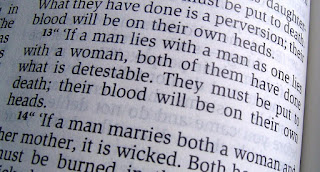What's it all for anyway? (The sheep, the goats, and a verse in Micah)
I've been involved in Evangelical Christian churches, educational institutions, and organizations since I was in high school. That's over 30 years. There seems to have been one overarching theme of all these "voices" influencing my spiritual development: The most important thing is your personal salvation.
I've been involved in week after week of Bible studies, worship services, Christian concerts and teaching events with an extremely PERSONAL focus. Main questions addressed are personal matters such as:
- "What do I believe?"
- "What is Jesus (or the Spirit, or the Bible) saying to me right now?"
- "How can I overcome these sin patterns and habits in my life?"
- "How can I recapture a spiritual 'high' that will keep me going for another week?"
There is usually a nod to the bigger issues facing our world, our nation, our community. But the idea is once I hear clearly from God through going to church, reading the Bible, being in small groups, etc, God will empower and guide me to do something about those bigger issues. There is rarely any atention given to larger world, national, community issues by the leaders of these churches and organizations. Nearly all focus is directed upon personal spiritual issues, with the hope that it will eventually create change in actual outward action.
I'm realizing that so much of what I'm involved in, and so much of what my current church (and most in my town) spends its money on is meeting the need for mental and spiritual experiences for the people of the organization. And it's hitting me that we are missing the mark.
There are huge issues out there.
- Racism.
- Sexism.
- Economic inequality (in our town, in our nation, in our world).
- Gun violence.
- Overwhelming national debt (and consumer debt).
- Overpopulation.
- Religious extremism leading to violence.
But the "it's all about me" focus of evangelical Christianity never gets around to addressing these issues.
Jesus told a parable about judgment day . He said it would be like a shepherd separating his flocks - sheep into one fold, and goats into another. Just as it is easy for shepherd to distinguish between the flocks, God will be able to distinguish between people who make it to paradise and those who do not.
(Matthew 25:31-46). What is the distinguishing factor? Before saying what it is, let me say some of the things it is NOT.
It is NOT
- Did they pray the sinner's prayer and really mean it?
- Did they accept Jesus as their personal Lord and Savior?
- Did they faithfully attend church meetings and develop friendships with other Christian people?
- Did they have the right set of beliefs about God, the Bible, Jesus, the end times, etc?
It is THIS
- Did they actually DO things to help the down and out, the downcast, the outcast, the forgotten ones of society?
Indeed the very notion of "accepting Jesus as your personal Lord and Savior" is not found anywhere in scripture. But very often God's concern for the poor, for justice, for non-violence is found. In fact much of the work of Old Testament prophets was to correct the political leaders of Israel and Judah when they forgot that God had called them lead with mercy and justice, not through violence and oppression.
In this story, those who are rejected are surprised and they ask the Master, when did we fail to love you and meet your needs? They probably think, "I've been going to synagogue, listening to Bible teaching, giving money, making temple sacrifices - I have proper beliefs about God. How did I end up on the outside?" And the Master simply says, "You failed when you failed to meet the needs of those real people who needed help."
The question I'm starting to ask myself is, "What would a church look like that was centered around the ideas of Micah 6:8?" (Micah 6:8 says He has shown you, O human, what is good and what is required of you: To do justly, to love mercy, and to walk humbly with your God.")
Working for justice for all, focusing on acts of mercy toward those who are in need, and cultivating a strong sense of humility - our understanding that God is so great and we are so small - these are keys to being the people of God, perhaps more than our experiences of personal worship and teaching. What would be sung about? What parts of the Bible would be emphasized? When and where would Christ followers actually get together? What would Children and Youth Ministry look like? Who would the church partner with that currently it is too afraid to even talk with?


Comments